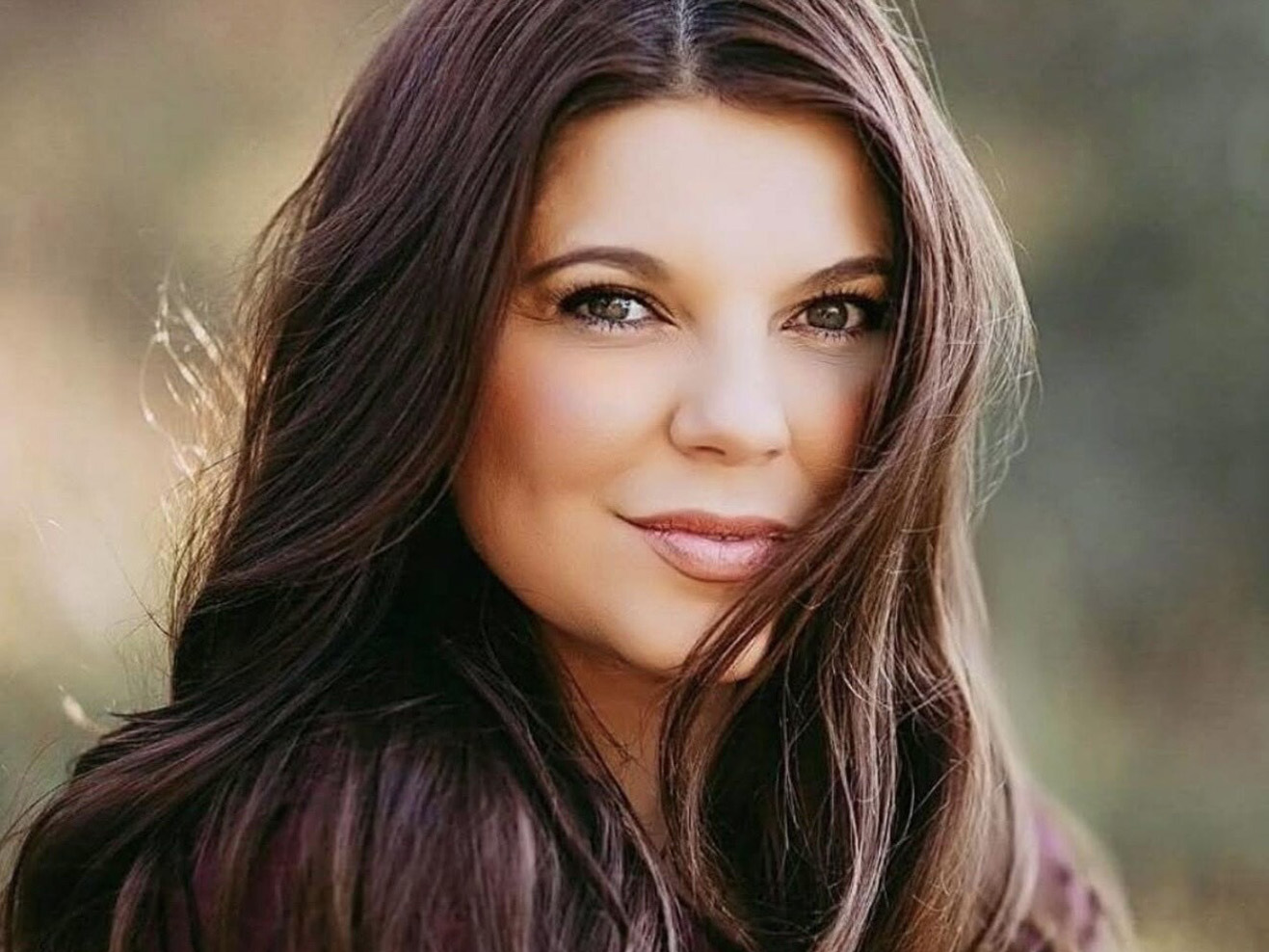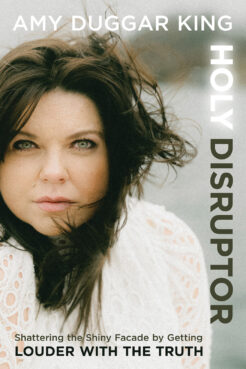
(RNS) — For years, she was known onscreen as “Crazy Cousin Amy.”
From 2008-2015, Amy Duggar King was featured in all 10 seasons of “19 Kids and Counting,” the hit TLC reality show about the ever-growing Duggar family.
The thing was, Duggar King wasn’t crazy — she was just a young adult who wore jeans, listened to rock music and had a shoulder-length haircut.
But in the fundamentalist world Duggar King’s 19 cousins were raised in, those factors rendered her an outsider. As shown in the 2023 docuseries “Shiny Happy People: Duggar Family Secrets,” the Duggars were avid followers of The Institute in Basic Life Principles, a Christian organization prescribing a set of rules for ordering family life. In her new memoir, Duggar King suggests these rules created a “superficial ‘holiness’ that is more about control than faith.” Though the Duggars put up a façade of effortless joy on TV, that came crashing down in 2015 when it was revealed that the family’s oldest son, Josh Duggar, had been investigated for molesting underage girls, including his younger sisters. Later, in 2022, Josh Duggar was sentenced for federal crimes related to child sexual abuse material.

“Holy Disruptor: Shattering the Shiny Facade by Getting Louder with the Truth” by Amy Duggar King. (Courtesy image)
These days, Duggar King, who identifies as a nondenominational Christian, is more known as an outspoken critic of narcissistic abuse and fundamentalism than as the quirky “crazy” cousin. Now, she’s telling her side of the story in “Holy Disruptor: Shattering the Shiny Facade by Getting Louder with the Truth,” a new book from Zondervan out Oct. 14.
RNS spoke to Duggar King about her experience on the show, generational trauma and how her faith has remained intact. This interview has been edited for length and clarity.
Can you talk about the “Crazy Cousin Amy” nickname?
I honestly didn’t like it at all. I didn’t understand why my name was being associated with the word crazy. I tried to push back, but I was quickly dismissed, unfortunately.
I wasn’t a wild child at all. I actually liked rules, and I have a moral compass. I’ve never had a police record, I’ve never done drugs, I’ve never had a one-night stand. While I was on the show, people would tell me, ‘Oh, we love you, but we’re also praying for your soul.’ I was like, I love Jesus. I was a youth leader. Unfortunately, people believe what they see on TV, and that’s it.
You describe your role in the TV series as a coping mechanism. How so?
I lived a very different kind of life at home. There was a lot of yelling, a lot of strife, a lot of turmoil, a lot of things I didn’t understand. So when I went over to my cousins’ house, it was my safe haven. I put my problems out of my head, and I put on a shiny happy mask, if you will. At my cousins’ house, they don’t believe in showing any kind of emotion that isn’t godly and happy all the time, so if you are struggling, you’re not allowed to show it. And so I just buried my feelings.
In your memoir you discuss your Grandpa Duggar’s abusive behavior. How might this context inform the denial and suppression that later surfaced among your uncle and his family?
I believe that if you don’t heal from generational trauma, it trickles down to the next generation. My grandpa, he lived a double life. From what my mom told me after he passed, I don’t know how he could have done the things he did and sleep at night. In the older generation, they didn’t really speak of it. It was very hush hush, and we were taught to respect the men regardless. It was swept under the rug and not dealt with at all. And so with my memoir, I just wanted to lift the rug completely.
Can you talk about how being on the show impacted you financially? What sorts of perks did you get, and what did your compensation look like?
The perks were throughout the entire time I was on the show. I had front row tickets. I had the newest handbag. I stayed in the nicest hotels. We were very blessed and spoiled. But underneath it all, I had to scrounge around for money to have gas in my car to even get to the house. It was like going from one life to another. But as far as actual compensation going into my bank account, unfortunately, it was zero.
At what point did it hit you that you weren’t getting paid for your work?
There was a time where producers handed me some money, and it was after we filmed, and they kind of did it in a hush hush way. They just handed me $600. And it was in that moment that I was like, ‘Oh my gosh, I think I’m being taken advantage of.’ It took me a long time, because I had this mentality that family would never hurt you. Now looking back, I wish I was not so naive and that I really stood up for myself. But at the same time, I didn’t know.
What are some teachings from the IBLP that especially impacted you, as someone who spent a lot of time in these spaces?
The biggest one is that women should be meek and mild, that they don’t talk back, have an opinion or really show emotion. I saw the girls being so kind all the time, so merciful and graceful, and that’s all fine and good. But knowing that there were darker things going on underneath, it was awful for me to know that those girls were struggling. And I was also struggling, and I couldn’t say anything.
Can you tell the story of how you found out about the abuse allegations against Josh Duggar?
I was just at Walmart, in the checkout line, and a magazine article caught my eye. I froze. It said the words “House of Horrors” with my family’s house on the front cover. I didn’t know what to believe. And in that moment, I read the article, and I was like, there’s no way. There’s no way. And I just stood there in disbelief. I called my mom, she knew nothing. She started crying. I called my grandma, she knew nothing, she started crying. Later, we all found out on national television that it was real.
You describe a moment in the book where you confront Josh. Can you tell us what you recall about that moment, and how it impacted you going forward?
I went over to my cousins’ house for answers, and I did get the answer that I needed. It wasn’t what I wanted, but it was what I needed. And when I left, I told him exactly how I felt, and I spoke truth, no matter who was gonna hear it. I can’t imagine anyone hurting those precious girls. But when I left, I was lighter than a feather. I put it all out there, they heard me, whether they wanted to or not. And I decided, I am changing. I am not known as crazy. I am known as someone who’s going to speak truth.
How did you and the Duggars ultimately cut ties?
I think it started to happen when I just started to speak out. I don’t think they consider that a godly response. I think that many of my family would rather handle it away from the media, behind closed doors. But here’s the thing, the IBLP is already a closed system. So what makes that healthy? I believe that you should protect children, and I’ve been very loud about it. I don’t think they know what to do with Amy that speaks her mind.
You’ve seen people who professed faith in God cause harm to you and others. How does your Christian faith remain strong?
It has not been an easy road. There’s been a lot of heartache and pain, and I had to walk away from a lot of people. Because they say they’re Christians, it makes you wonder, is this really how God is? If this is Christian faith, then do I even want to be around that or believe that? But I always go back to a verse that says God is not the author of confusion. God embodies peace. I didn’t have any peace at all growing up. I didn’t have it at my cousins’ house. I didn’t have it at my house, I didn’t have it on TV. I didn’t have it. And now I filter everything in my life, every person, every place, every song, every TV show, through the filter of peace.
What is a holy disruptor?
A holy disruptor is someone who looks at things for what they are. They break toxic patterns and cycles in a family. There was one point where I was considered the black sheep of the family. I am not that anymore. I’m the one changing how it’s going to go for generations to come. And anyone can do that, anyone can set boundaries. Anyone can change the course of their life.
